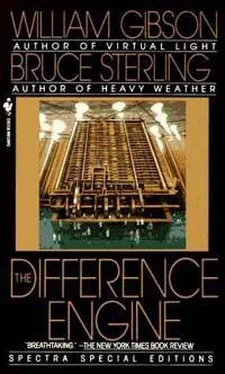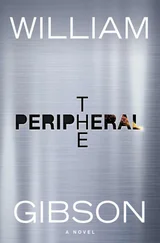William Gibson - The Difference Engine
Здесь есть возможность читать онлайн «William Gibson - The Difference Engine» весь текст электронной книги совершенно бесплатно (целиком полную версию без сокращений). В некоторых случаях можно слушать аудио, скачать через торрент в формате fb2 и присутствует краткое содержание. Жанр: sf_cyber_punk, fantasy_alt_hist, на английском языке. Описание произведения, (предисловие) а так же отзывы посетителей доступны на портале библиотеки ЛибКат.
- Название:The Difference Engine
- Автор:
- Жанр:
- Год:неизвестен
- ISBN:нет данных
- Рейтинг книги:3 / 5. Голосов: 1
-
Избранное:Добавить в избранное
- Отзывы:
-
Ваша оценка:
- 60
- 1
- 2
- 3
- 4
- 5
The Difference Engine: краткое содержание, описание и аннотация
Предлагаем к чтению аннотацию, описание, краткое содержание или предисловие (зависит от того, что написал сам автор книги «The Difference Engine»). Если вы не нашли необходимую информацию о книге — напишите в комментариях, мы постараемся отыскать её.
The Difference Engine — читать онлайн бесплатно полную книгу (весь текст) целиком
Ниже представлен текст книги, разбитый по страницам. Система сохранения места последней прочитанной страницы, позволяет с удобством читать онлайн бесплатно книгу «The Difference Engine», без необходимости каждый раз заново искать на чём Вы остановились. Поставьте закладку, и сможете в любой момент перейти на страницу, на которой закончили чтение.
Интервал:
Закладка:
"You'll come again then? When will you see me?"
"Soon."
She sighed, knowing he was lying. "Go then, if you must. But listen, Neddie, I do know you like me. And I don't remember your proper name exactly, but I know I've seen your portrait in the papers. You're a famous savant, and you have a deal of tin. I'm right about that, aren't I?"
Mallory said nothing.
She hurried on. "A fellow like you can get in bad trouble with the wrong sort of London girl. But you're safe as houses with Hetty Edwardes, for I only go with gentlemen, and I'm very discreet."
"I'm sure that you are," Mallory said, dressing hastily.
"I dance Tuesdays and Thursdays at the Pantascopic Theatre, down Haymarket. Will you come and see me?"
"If I'm in London."
He left her then, and felt his way out of the place. On his hasty way to the stairs he bloodily scraped his shin on the pedal of someone's chained bicycle.
The sky above the Hart was like nothing Mallory had ever seen, yet he knew it. He had seen such a sky with his mind's-eye, a lowering dome abrim with explosive filth, awash with obliterating dust—a sky that was the very harbinger of Catastrophe.
By the twilight blur of the fully risen sun he reckoned it near eight o'clock. Dawn had come, yet brought no day. The Land Leviathans had seen this very sky, he knew, after the earth-shaking shock of the Great Comet. For the scaly herds, ceaselessly progressing through the teeming jungles, driven always by a mighty hunger in their great fermenting bellies, this had been the sky of Armageddon. Storms of Cataclysm lashed the Cretaceous earth, vast fires raged, and cometary grit sifted through the roiling atmosphere, to blight and kill the wilting foliage, till the mighty Dinosauria, adapted to a world now shattered, fell in massed extinction, and the leaping machineries of Evolution were loosed in chaos, to re-populate the stricken Earth with strange new orders of being.
He scuffed down Flower-and-Dean Street, awestruck, coughing. He could see little more than thirty feet ahead, for the alley roiled with a low-lying yellow fog that blurred his eyes with its clinging acid tang.
More by luck than design, he emerged on Commercial Street, ordinarily a thriving Whitechapel avenue. Deserted now, its smooth tarmac was spread with fountained shards of shop-front glass.
He walked a block, then another. There was scarcely a window intact. Cobbles, grubbed up from side-streets, had been flung right and left like a shower of meteors. A seeming whirlwind had descended on a nearby grocery, leaving the street ankle-deep in dirty snow-drifts of flour and sugar. Mallory picked his way through battered cabbages, squashed greengages, crushed jars of syrupped peaches, and the booted footballs of whole smoked hams. Scatterings of damp flour showed a stampede of men's brogues, the small bare feet of street-urchins, the dainty trace of women's shoes, and the sweep of their skirt-hems.
Four mist-shrouded figures, three men and a woman, all dressed respectably, all carefully masked in thick cloth, came shuffling into view. Noticing him, they pointedly crossed the street. They moved slowly, unhurriedly, talking together in low tones.
Mallory moved on, splintered glass crunching under his shoe-heels. Meyer's Gent's Furnishings, Peterson's Haberdashery, LaGrange's Parisian Pneumatique Launderette, all presented disintegrated store-fronts and doors torn off their hinges. Their fronts had been thoroughly pelted with stones, with bricks, with raw eggs.
Now a more cohesive group appeared. Men and young boys, some rolling heaped barrows, though they were clearly not costers. In their masks, they seemed tired, bemused, somber, as though attending a funeral. In their aimless progress they slowed before a sacked cobbler's, picking over the scattered shoes with the limp enthusiasm of scavengers.
Mallory realized that he had been a fool. While he had wallowed in mindless dissipation, London had become a locus of anarchy. He should be home in peaceful Sussex now, with the family. He should be readying for little Madeline's wedding, in clean country air, with his brothers and sisters at hand, with decent home-cooked food and decent homely drink. A sudden agony of homesickness struck him, and he wondered what chaotic amalgam of lust and ambition and circumstance had marooned him in this dreadful, vicious place. He wondered what the family were doing at that very moment. What was the time, exactly?
With a jolt, Mallory remembered Madeline's clock. His sister's wedding-gift was sitting in its brass-hasped carry-case in the safety-box of the Palace of Paleontology. The lovely fancy clock for dear Madeline, now grotesquely out of his reach. The Palace was seven miles from Whitechapel. Seven miles of roiling chaos.
There must be some way back, some way to cross that distance, surely. Mallory wondered if any of the city's trains were running, or the omnibuses. Perhaps a hansom? Horses would choke in this foul mist. He was down to shank's mare. Likely any effort to cross London was foolish, and likely it would be wisest to cower in some quiet cellar like a rat, hoping for Catastrophe to pass him over. And yet Mallory found his shoulders squaring, his legs tramping forward of their own accord. Even the throbbing in his parched head began to pass as his wits focused on a goal. Back to the Palace. Back to his life.
"Hullo! Say there! Sir!" The voice echoed over Mallory's head like the cry of a bad conscience. He glanced up, startled.
From a third-floor window of Jackson Bros., Furriers & Hatters, protruded the black barrel of a rifle. Behind it, Mallory made out the balding head of a spectacled shopping-clerk, leaning from his open window now to reveal a striped shirt and scarlet braces.
"May I be of service?" Mallory called, the phrase emerging out of reflex.
"Thank you, sir!" the clerk cried, his voice cracking. "Sir, could you, please, have a look at our door there—just to the side, below the steps? I believe—there may be someone hurt!"
Mallory waved one hand in reply, walked to the shop's entrance. Its double-doors were intact but badly battered, dripping splattered eggs. A young man in a sailor's striped blouse and bell-bottomed trousers lay sprawled there, facedown, a pry-bar of forged iron near his hand.
Mallory seized the shoulder of the sailor's coarse blouse and turned him over. A bullet had taken him through the throat. He was quite dead, and his nose had been mashed to one side by the pavement, giving his bloodless young face a bizarre cast, so that he seemed to have come from some nameless country of sea-going albinos.
Mallory straightened. "You've shot him dead!" he shouted upward.
The clerk, seeming rattled, began coughing loudly, and made no reply.
Mallory spied the wooden butt of a pistol tucked in the dead sailor's intricately knotted sash; he tugged it out. A revolver of unfamiliar make, its massive cylinder curiously slotted and grooved. The long octagonal barrel, under-hung with a sort of piston, stank of black-powder. He glanced at the furrier's battered door. Clearly an entire mob had been at it, an armed mob, bent on the worst kind of mischief. The wretches must have scattered when the sailor had been shot.
He stepped into the street, waving the pistol. "The rascal was armed!" he shouted. "You did well to—"
A bullet from the clerk's rifle screamed off a cement stair-step, bleaching it white with impact and narrowly missing Mallory on the ricochet.
"God blame ye, ye cack-handed fool!" Mallory bellowed. "Stop that this instant!"
There was a moment's silence. "Sorry, sir!" the clerk cried.
"What in hell do you think you're doing?"
"I said I was sorry! You best throw away that gun, though, sir!"
"The hell I will!" Mallory roared, slipping the pistol into the waistband of his trousers. He meant to demand that the clerk come down and decently cover the dead man, but he thought better of it as other windows rattled up on their casters, four more rifle barrels appearing in defense of Jackson Bros.
Читать дальшеИнтервал:
Закладка:
Похожие книги на «The Difference Engine»
Представляем Вашему вниманию похожие книги на «The Difference Engine» списком для выбора. Мы отобрали схожую по названию и смыслу литературу в надежде предоставить читателям больше вариантов отыскать новые, интересные, ещё непрочитанные произведения.
Обсуждение, отзывы о книге «The Difference Engine» и просто собственные мнения читателей. Оставьте ваши комментарии, напишите, что Вы думаете о произведении, его смысле или главных героях. Укажите что конкретно понравилось, а что нет, и почему Вы так считаете.









